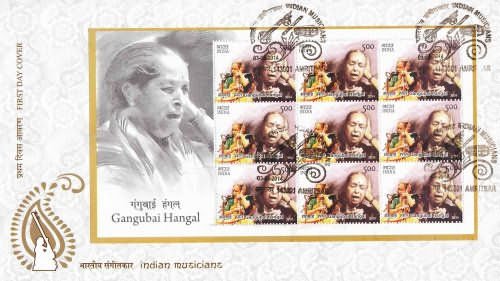Gangubai Hangal

Technical Data
| Stamp Set | Indian Musicians |
|---|---|
| Date of Issue | September 3, 2014 |
| Denomination | Rs. 45 |
| Quantity | 100,000 |
| Perforation | 13½ |
| Printer | Security Printing Press, Hyderabad |
| Printing Process | Wet Offset |
| Watermark | No Watermark |
| Colors | Multicolor |
| Credit (Designed By) | Ms. Nenu Gupta Sh. Sankha Samanta |
| Catalog Codes |
Michel IN 2841KB |
| Themes | Famous people | Men | Musicians | Singers |
Introduction
Gangubai Hangal was one of the most distinguished and powerful voices of Hindustani classical music. A leading exponent of the Kirana gharana, she was celebrated for her deep, resonant voice and her unwavering dedication to the classical tradition. Her life journey is a remarkable story of determination, resilience, and musical brilliance.
Early Life
Gangubai Hangal was born on 5th March, 1913, in Dharwad, Karnataka, a region renowned for producing some of India’s greatest classical musicians. She received her first training from her mother, Ambabai, an accomplished Carnatic vocalist. This early exposure to music shaped Gangubai’s artistic inclination and laid the foundation for her future achievements.
Her talent shone early—at the age of 11, she performed the welcome song at the Congress Session in Belgaum in 1924, in the presence of eminent freedom fighters including Mahatma Gandhi, Jawaharlal Nehru, Sarojini Naidu, and Maulana Abul Kalam Azad.
Musical Journey
Gangubai Hangal’s first public concert in Mumbai in 1931 marked the beginning of a long and illustrious musical career. Her recordings with HMV and appearances on All India Radio greatly expanded her reach, establishing her as one of the foremost voices of Hindustani music.
Her singing was characterized by:
- A deep, powerful, and emotive voice
- Mastery over khayal and other classical forms
- Strong adherence to the stylistic purity of the Kirana gharana
- Expressive improvisation that preserved the mood and soul of the raga
Throughout her life, she faced personal challenges and societal barriers, but remained steadfast in her pursuit of music, earning immense respect and admiration.
Honours and Recognition
Gangubai Hangal received several prestigious awards for her contribution to Indian classical music, including:
- Padma Bhushan (1971)
- Tansen Award (1984)
- Padma Vibhushan (2002)
Her accolades reflect her status as a cultural icon and a towering figure in Indian music.
Later Life and Legacy
Gangubai Hangal continued to perform and inspire generations of musicians and listeners. She dedicated herself to nurturing young talent and preserving the classical tradition. Her legacy lives on through her recordings, students, and the institutions established in her honour.
She passed away on 21st July, 2009, but her voice remains a shining symbol of devotion, dignity, and artistic excellence.
First Day Cover


Leave a Comment
You must be logged in to post a comment.